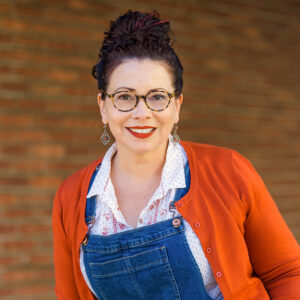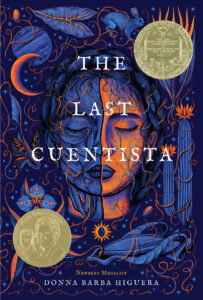The PEN Ten: An Interview with Donna Barba Higuera
The PEN Ten is PEN America’s weekly interview series. This week, PEN America’s Literary Awards Program Director Donica Bettanin speaks with Donna Barba Higuera, author of The Last Cuentista (Levine Querido, 2021). Amazon, Bookshop. Donna will be appearing at this year’s Latinx Kidlit Book Festival, running October 13–14.

1. The Last Cuentista follows Petra Peña, whose dream of becoming a storyteller becomes an urgent necessity after a comet destroys Earth. Who were the storytellers who shaped your life?
For me, there were two kinds of storytellers. Those who helped me fall asleep, or scared me so badly with their stories I couldn’t fall asleep. This was mostly my grandmother and father. But I was also attached to the written stories of the books that helped me escape my everyday life and travel to magical and otherworldly places; Ursula Le Guin, Madeleine L’Engle to name a few.
2. Has the idea of living on another planet always interested you?
Absolutely! Growing up in a small desert town, there was nothing I did more than daydreaming of escape. I was a huge sci-fi nerd kid, so I traveled with the Starship Enterprise and went to lots of planets in my imagination.
“These stories are ones I thought I shared only with my grandmother or those who told them to me. I am finding this isn’t true. So many know the stories, or versions of them.”
3. Is there anything that has surprised you about how readers have responded to the book?
Yes. The thing that has surprised me most is how connected readers feel to Petra and her stories. So many of these are stories and folklore I felt others had never heard or wouldn’t relate to. And many haven’t. But they are so welcoming of the things I once thought others would find strange. These stories are ones I thought I shared only with my grandmother or those who told them to me. I am finding this isn’t true. So many know the stories, or versions of them.
4. The natural world plays a powerful role in Petra’s memories of Earth. How do you connect with these elements when writing?
I live in the Pacific Northwest on the Olympic Peninsula. I spend a lot of my time staring at the mountains, trees and water as well as working in my garden. I always have. Even when I was young and lived in the dry desert, I spent time outside with my parents and grandmother and friends. So, Petra’s memories are drawn directly from my own.
5. What does your creative process look like? How do you maintain momentum and remain inspired?
I have found that I need to work away from distractions. I often write in a coffee shop because if I’m at home, I will always be thinking of something that needs tending to, like laundry or cleaning. I also have to turn off access to wi-fi and focus on my work, so I’m not drawn down the social media rabbit hole.
“To have The Last Cuentista and Petra’s story recognized was very emotional for me. It told me that others connected to Petra. The book is so much a part of me, that means readers also connected to me. That is very humbling.”
6. The Last Cuentista won the 2022 Newbery Medal, congratulations! How did it feel to have your work recognized in this way? What kind of difference can an award make to an author’s career?

Thank you. It was all very unexpected! To have The Last Cuentista and Petra’s story recognized was very emotional for me. It told me that others connected to Petra. The book is so much a part of me, that means readers also connected to me. That is very humbling. On top of that, I was in some amazing company with the Newbery Honor winners: Kyle Lukoff, Darcie Little Badger, Rajani LaRocca and Andrea Wang. Aside from allowing me to now be a full-time writer, I think the biggest change so far to my career and life from winning the Newbery Medal is I now travel both physically and virtually all over the world. The Last Cuentista and my other books now have this vast connection to kids everywhere.
7. Can you remember a moment of frustration you encountered in the writing process for The Last Cuentista? How did you overcome it?
I can’t say there was a moment of frustration for me. There certainly were challenges. One thing I think is sort of funny is that originally, I didn’t have Petra actually telling the stories to others aloud. My editor, Nick Thomas, said, “Ummmh, why is Petra just telling us she’s telling the story? How about you actually let her tell the story?” I don’t know why I didn’t in the first place. I think I didn’t have the confidence myself as a storyteller, much like Petra doesn’t. So, I find it funny that now when Petra is telling the stories in the book to the other children, they are my favorite scenes.
8. What’s a piece of art (literary or not) that inspires your work?
Definitely all that surrounds me in nature inspires me. To me, art is creation. I spend a lot of my time watching animals and what they create. Does that count? But also, I’d say I revisit the stories I loved when I was young. I will always read Le Guin. I am also now a huge fan of Neil Gaiman.
“I think I wrote about the erasure of story because it is what I fear most. I thought things had gotten better. Yet, here we are again. So that is what I think is the biggest threat to free expression: those who are unwilling to see any experience outside their own.”
9. Your main character must navigate a new world where difference and conflict have been eradicated. What do you consider to be the biggest threat to free expression today? Have there been times when your right to free expression has been challenged?
The Last Cuentista’s main conflict lies in its villains’ attempt to erase history and culture and story. I am often asked if I wrote this book in response to all the book banning. I did not. I wrote this before this issue came back into the picture. I think I wrote about the erasure of story because it is what I fear most. I thought things had gotten better. Yet, here we are again. So that is what I think is the biggest threat to free expression: those who are unwilling to see any experience outside their own.
I’ve yet to have my books challenged in this way. But many of my dear friends have had their books banned. I know that if the book banning continues on its current path, my books will soon follow. Even though my nature is to be non-confrontational, we have to continue speaking up against book banning. We have to for the sake of our children and grandchildren.
10. What is the last book you read? What are you reading next?
I just finished reading Parable of the Sower by Octavia E. Butler. It’s a short story. I hadn’t read it in years. It is still just as haunting as the first time I read it. I am re-reading Ship Breaker by Paolo Bacigalupi. I have a love of all things sci-fi, fantasy and dystopian, and am drawn into reading those genres over and over again.
Donna Barba Higuera’s Middle Grade and Picture books reinvent history, folklore, and or her own life experience into compelling storylines. She lives in Washington State with her husband, four kids, three dogs and a frog.
Her books include Lupe Wong Won’t Dance, El Cucuy Is Scared, Too!, and The Last Cuentista, and have won awards including: the Newbery medal, both Pura Belpré medal and honor, PNBA best book of the year award, and the Sid Fleischman award for best children’s humor book of the year.






